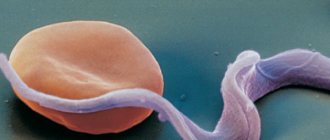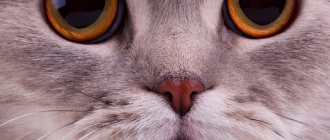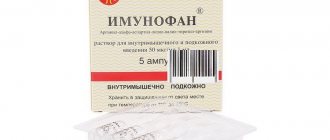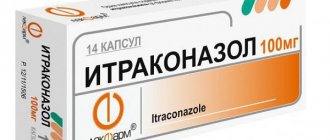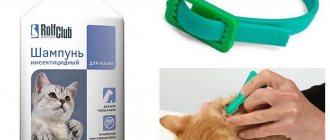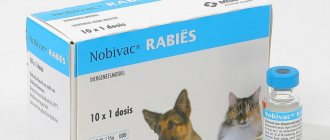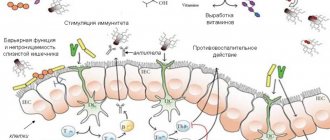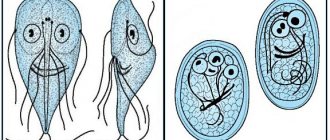Can a cat get diarrhea after deworming?
Any problem with an animal's health should cause concern to the owner. Cats are no exception. If the owner notices that the pet has diarrhea, then the cause of the disease should be identified as early as possible. In some cases, at an appointment with a veterinarian, owners note that cats have diarrhea after deworming. This phenomenon is not uncommon. You should understand the entire physiological process; you need to study in advance what causes diarrhea and how to help your patient in a serious condition.
Symptoms of diarrhea in cats and kittens
Many owners often do not pay attention to their pet’s stool, but this is in vain, because sometimes serious disorders can occur, which as a result can lead to serious problems with the animal’s health.
The most important and obvious symptom of diarrhea is frequent loose stools. But besides this, other signs may also be observed:
- frequent attempts to defecate;
- manifestations of flatulence;
- the presence of mucus and blood in the stool.
Important! If a cat has diarrhea with an uncharacteristic color, for example, black or green with impurities of blood and mucus, then in these situations you need to immediately visit a veterinarian. These signs may indicate the presence of a serious illness, and the slightest delay can lead to unpleasant consequences.
The most obvious symptom of diarrhea in a cat is frequent loose stools. In addition, additional symptomatic manifestations of the disorder may be present:
- Attempts to defecate;
- Flatulence;
- Mucus and/or blood in the stool.
In some cases, secondary symptoms may occur, such as:
- Decreased appetite;
- Weight loss;
- Dehydration;
- Fever;
- Lethargy;
- Vomiting.
But in order not to panic in vain, you should familiarize yourself with the symptoms and the reasons for their occurrence in more detail. After all, in most cases everything ends quite well.
Diarrhea in cats can occur suddenly and end just as suddenly. It can also bother the animal for months, practically without stopping or appearing from time to time. A single bout of diarrhea is not a cause for alarm, but if your cat's diarrhea lasts for more than two days, this already signals a more serious problem.
Conventionally, diarrhea in cats is divided into three groups in terms of duration and degree of “neglect” of the situation:
- Acute (if several days).
- Chronic (if the cat’s diarrhea lasts for more than a week).
- Intermittent (if month).
If the cause of the disorder is poor nutrition, poor quality food, etc., you can limit yourself to symptomatic treatment. If a cat has short-term, uncomplicated diarrhea, then a starvation diet for one or two days is the most acceptable treatment measure. It is also advisable to reduce the amount of water in the first hours after signs of the disorder appear. Providing your cat with peace is also a good idea.
Diarrhea in cats that lasts a week or more is a signal that the pet needs to be examined and treated at a veterinary clinic. With prolonged disorder, the cat’s body becomes dehydrated, which only aggravates the animal’s condition. Therefore, it is highly undesirable to delay in this case.
Cause of diarrhea after anthelmintic therapy
Before starting anthelmintic therapy, the owner must clearly understand that drugs almost always cause a lot of unpleasant symptoms in the animal. You should be prepared for this. Most deworming medications have a long list of side effects that should be studied before starting treatment. Among the many problems after therapy, a cat often develops diarrhea after anthelmintic. The phenomenon is very common, and the following aspects may be the cause:
- Incorrectly selected drug. Before purchasing a ready-made medicine, it is very important to study whether it is suitable for your specific case. There are situations when cats begin to have an allergic reaction, develop diarrhea, and increase their body temperature due to the presence of certain substances in the drug. Therefore, if you carefully read the instructions for the medicine, you can choose the safest option for your cat. Very often, owners purchase anthelmintics for their four-legged friends at a regular human pharmacy. This is not correct, you should contact a veterinarian for a prescription, and buy medicine only in veterinary pharmacies;
- Failure to comply with admission rules. Many owners do not pay attention to the medication schedule. As a result, the mode of operation of the active substances is disrupted. The breaks between taking pills should be the same, without gaps that are too large or, conversely, too small. Only in this way will the medicine have the correct effect;
- Taking a low-quality drug. Often, owners purchase the product and then it sits in the cabinet for a long time. As needed, the medicine is given to the animal without paying attention to expiration dates. This is not correct; treatment should be carried out only with fresh drugs. To save money, medications are often purchased from questionable stalls. In this case, you cannot be sure of the quality of the product, because fakes are very often found in small, unlicensed stores. As a result, the owner will observe that the kitten has diarrhea after deworming;
- Treatment during a cat's illness. It is not allowed to give anthelmintics to an animal when the pet is sick or feels unwell. Therapy can have a negative impact not only on the main problem, but also cause the development of other symptoms. It should be remembered that deworming therapy should not be carried out on a weakened body.
Any anthelmintic is essentially poison for the worms living inside the cat. Therefore, taking medications significantly affects the animal’s digestive system. There is no need to panic if your cat develops diarrhea; you need to be prepared in advance to eliminate the unwanted symptom.
If your cat has diarrhea without complications
What to do if your cat only has diarrhea and no other aggravating symptoms? In addition to helminthic infestations and food poisoning, diarrhea in a cat can be caused by an infectious disease, pathology of internal organs and other changes associated with the normal functioning of the body. It is also worth considering that cats are individual creatures and the same symptoms in different animals do not necessarily mean the presence of a similar disease. Therefore, to find out the causes and develop effective treatment, you need to contact a specialist.
Why might a cat have diarrhea? The problem can occur in different cases:
- Bowel disease;
- Infection;
- Psycho-emotional disorder;
- Food allergies;
- Invasive disease;
- Poor nutrition;
- Binge eating;
- Poisoning.
We suggest you read: Can cats be given dog food and fish
? How to treat a cat for diarrhea at home? If the cat’s health is fine and diarrhea does not in any way affect its appetite and playful mood, then changing its diet or fasting day is a good opportunity to solve the problem without resorting to medicine. It should be borne in mind that even if the symptoms of liquid discharge are one-time in nature, this is still a reason to control the animal’s nutrition.
If the diarrhea does not stop for several days, and what is worse, the feces acquire an unusual smell and color - this is a reason to rush to see a veterinarian. Many cat diseases develop rapidly, and delay can be fatal for your pet.
Associated symptoms
Along with diarrhea, cats may experience a number of signs during anthelmintic therapy. Some of the most common accompanying symptoms include:
- diarrhea with blood in a kitten after deworming;
- lethargic and apathetic state;
- poor appetite or, on the contrary, too increased;
- The pet tries to drink more water.
It is very important to monitor your pet’s condition; you should remember that the most dangerous thing during diarrhea is dehydration. Lack of water in organs and systems can cause death. If the owner does not see for a long time that the cat is drinking clean water, then he should be forced to give her some liquid through a syringe.
Treatment of a cat with diarrhea
Diarrhea in a small kitten usually begins due to an increased dosage of the drug. As a result, severe intoxication develops and diarrhea occurs. Sorbents are used to treat both small kittens and adults. Among the most popular products are Smecta, Activated carbon, Enterosgel.
To prevent unpleasant symptoms, you must follow simple rules. Do not administer anthelmintic therapy to kittens whose weight does not exceed 500 g, and also follow the recommendations of a veterinarian, dosage of the drug, regimen and duration of the course. Deworming is a very important procedure that must be carried out annually, especially for free-ranging cats. Proper treatment is the key to quickly getting rid of the disease.
Causes of diarrhea - general information
Diarrhea (diarrhea) is nothing more than symptoms indicating a malfunction of the digestive system. There are many possible causes, some of them very dangerous, but treatment without a diagnosis can also harm the kitten's health.
Loose stool indicates that the lining of the intestines is working very hard to try to get rid of something. In fact, diarrhea is a natural method of cleansing the body , which is very effective if the baby has eaten unusual or stale food.
The danger of diarrhea lies in its consequences - dehydration, loss of strength, thickening of the blood, death of friendly intestinal microflora, etc.
Dehydration does not always develop, but if diarrhea occurs more than 3 times a day or lasts more than 2 days, there is reason to worry. For reference, in an adult cat dehydration develops within 48 hours, while for a kitten the period is much shorter – from 10 to 12 hours.
Many experienced owners know that after deworming, the baby may have digestive problems. In fact, if the prevention of worms is carried out according to schedule and with high-quality drugs, there should not be any acute reaction. The problem is that choosing the optimal, mild drug for a particular animal can only be done by trial and error.
Please note that after anthelmintic treatment, it is normal to observe a slight upset, but not “water” diarrhea, mixed with blood, putrefactive odor, etc. More severe consequences can be expected if you pick up a kitten on the street and its fate is unknown. In this case, the kitten is guaranteed to be infected with worms, and the severity of the consequences depends on their number.
If your baby has a swollen, hard belly, the reason may be:
- Flatulence - a street kitten eats whatever it needs, and its microflora is not ready to digest unnatural food. After eating food, a fermentation process begins in the intestines, which can cause bloating, vomiting, diarrhea or constipation.
- Severe infestation - the kitten’s body is not able to resist helminths. The worms multiply quickly and fill the entire intestine. The abdominal cavity appears distended and is firm to the touch. Additional symptoms include diarrhea, vomiting, and signs of intoxication. There will most likely be a lot of mucus and worm fragments in the stool. If a kitten is vomiting, worms may be found in it.
It is important to understand that if diarrhea began after anthelmintic, it may mask a symptom of an illness, and not a reaction to the drug.
Surely you understand that intestinal upset can occur for hundreds of reasons, when it comes to kittens, the list of likely causes narrows. The most common reason is the body’s reaction to an atypical diet. Even if you feed your kitten good, fresh foods, his intestines may not be ready to digest them. Over time, if you gradually expand your pet's diet, the body will adapt to digesting adult food and the symptoms of intestinal upset will go away.
In addition to reasons associated with a change in diet, diarrhea in kittens can develop as a reaction to:
- Overeating – without further ado, most kitten owners admit that their pets often overeat. It’s logical, because it’s simply impossible to refuse a baby who makes eyes and asks for more. However, overeating is fraught not only with diarrhea, but also with vomiting, disruption of the digestive system, increased gas formation and other problems. Try to teach your kitten to feed on a schedule from an early age.
- Eating a foreign object - playful kittens quite often gnaw on objects that interest them. Cellophane bags, Christmas tree tinsel, wires and threads look especially tempting. Swallowing a fragment of such a toy can lead to irritation of the mucous membranes and diarrhea. Please note that swallowing cellophane can cause intestinal blockage, and the insulating material of the wires is toxic, so you need to take care in advance to ensure that your baby does not get to dangerous toys.
- Allergies – at the age of 6–8 months, the kittens’ diet expands to the maximum and it is during this period that food allergies, if any, appear. Most often, an allergy that appears at an early age is lifelong and cannot be treated, so the kitten’s diet must be adjusted so that it remains balanced, but does not contain foods harmful to the kitten.
- Stress is a common cause of diarrhea in kittens, which occurs after moving house or visiting a veterinary clinic. There is nothing wrong with this, but you need to monitor the kitten’s condition. If the baby visually looks healthy, cheerful, and asks to eat, there is no need to worry.
- Poisoning by poisons and household chemicals - unfortunately, kittens very often end up at the vet in a state of acute poisoning from something they found in their home. Household chemicals have a sharp, interesting smell. Of course, not every kitten will lick powders or other chemicals, but sometimes interest overcomes reason.
- Congenital pathologies - cats have many hereditary diseases that can manifest themselves from the first day of life to a year or older. None of the owners is immune from such problems, but most often the nature of the disease manifests itself quite clearly. In most purebred cats, digestion is sensitive, that is, regardless of the age of the kitten, its intestines can react sharply to “heavy” food.
It is important to understand that if you experience diarrhea with blood, a lot of mucus or a strong putrid odor, you need to consult a doctor. A large number of worms dying at one time can lead to poisoning, blockage or perforation of the intestinal walls.
Causes of diarrhea in cats
Diarrhea is considered the main sign of a disorder in the digestive system. This means that the stomach and intestines, for some reason, cannot cope with their functions. But in any case, this is a pathological condition that requires timely treatment.
So why did my cat have diarrhea? What reasons can provoke it? They can be very different:
- incorrect diet or its sudden change. If you want to change the animal’s diet, then introduce new foods gradually so that this does not provoke serious disturbances in the functioning of the digestive system. Loose stools can occur in cases where pets are overfed with fatty foods, meat, raw fish, as well as dry food;
- change of water. A cat usually gets used to one composition of water. But a sudden change in it, for example, when moving to a country house or while traveling, can lead to the appearance of diarrhea. In these cases, it is recommended to carry the necessary supply of water with you;
- food poisoning. This often happens when the cat is allowed to go outside. In the wild, an animal can easily become poisoned as a result of eating game or debris from garbage;
- Diarrhea can occur if your pet has a food allergy. Usually during it there is a reduced ability to digest food from the owner’s table;
- Diarrhea is often provoked by various stressful situations. Anxiety in a pet can occur when a new animal appears in the house, when staying in special hotels for animals, when visiting a veterinarian, and diarrhea can also be caused by a long absence of the owner;
- ingestion of hair clumps into the stomach. But they are even useful, they cause complete cleansing of the stomach;
- diarrhea may be a reaction to medications. Each cat has individual characteristics that may manifest themselves when using different medications.
Diarrhea is common in a pregnant cat. If it occurs 1-2 times and then stops, then there is no reason to worry. But if diarrhea bothers the animal for a long time, then you should pay attention to this factor. In the last stages of pregnancy in a cat, diarrhea can be the cause of a pathological process.
It is worth noting! Diarrhea in a cat after childbirth is considered common. It is a consequence of the severe stress that the animal experiences during childbirth. After some time, diarrhea completely stops, the activity of the digestive system is restored.
The causes of diarrhea in cats can be various diseases:
- Quite often, diarrhea is observed in a cat after deworming. Diarrhea is often caused by various parasites - worms, roundworms, worms, Giardia and others. During the presence of helminths, the cat may experience diarrhea with blood and mucus;
- if the animal has diabetes mellitus, which is accompanied by metabolic disorders;
- manifestations of pancreatitis;
- may occur with cancer;
- diarrhea can occur with obstruction and other intestinal pathologies;
- may be a consequence of liver disease;
- may occur in renal failure;
- diarrhea may occur during infectious diseases;
- nausea and diarrhea, which may include bloody discharge, can occur with bacterial infections, for example, with salmonella, clostridium and others;
- Diarrhea in a cat may be a consequence of poisoning of the body.
How to worm a kitten correctly?
Any consequences of worm prevention can be avoided if the procedure is carried out correctly.
The first rule is mandatory deworming, regardless of how the kitten lives. Even if your pet doesn't go outside, he can become infected with worms from you, your shoes and clothes, grocery bags or food. Prevention of worms is mandatory before vaccination. Kittens are usually vaccinated at 3–4 months of age. At least 2 weeks in advance, you need to get rid of the parasites.
After receiving vaccination, the kitten needs to undergo worm prevention once every 3-6 months; it is better to consult a doctor about the period. Be sure to contact your veterinarian if you are not sure that your pet is healthy. Anti-worm medications can be harmful and aggravate the animal’s condition.
Important! Cats are prevented from worming once every 6 months, provided that they do not receive raw food.
The choice of drug is very narrowed, since only a few types of suspensions and tablets are available for kittens. Prevention is carried out strictly according to the instructions; we repeat the main points:
- The drug should be given in the morning before meals.
- The dosage is calculated strictly by weight.
- If prophylaxis is carried out for the first time, especially for a kitten from the street, another dose of the drug should be given to the kitten after 10–14 days.
The composition of anthelmintic drugs for kittens usually contains only paralyzing substances. That is, the worms do not die, but cannot move and exit naturally. Such preparations do not harm helminth eggs, so repeated treatment is required.
If you know for sure that the kitten is affected by worms, a few hours after taking the anthelmintic, you need to give adsorbents. It is better to use substances that eliminate toxins and coat the intestinal walls, for example, Smecta, Enterosgel, Phosphalugel, etc.
Similar advice applies to the situation if the kitten’s condition has deteriorated sharply. Usually the baby becomes bored and inactive 4–6 hours after taking the drugs. This picture indicates intoxication, which means sorbents need to be given several times during the day.
Can a kitten have diarrhea from worms?
The life of a little kitten directly depends on the actions of its owner. Poor living conditions or simple neglect of disease prevention can lead to a common and dangerous problem for a small organism - infection with helminths. The absence or delay in treatment of helminthic infestation can lead to serious complications, poisoning of the body and even death.
Ways of infecting a kitten with worms
Little pets can become infected with worms, even if they have never gone outside in their lives. Street kittens are 100% likely to be susceptible to this disease.
Pets can become carriers of worms:
- having become infected from a mother cat while still in the womb or through mother’s milk;
- by eating low-quality raw meat or fish;
- playing with your outdoor shoes or clothes;
- contacting other animals that carry worms;
- hunting for flies and mosquitoes;
- If a kitten is infected with fleas, then worms will most likely be added to this disease, because Direct fleas are carriers of worm larvae.
How do worms affect the body?
By parasitizing the animal's body, worms and their larvae take away most of the useful substances and vitamins from the kitten, quickly depleting the kitten's vitality.
Parasites can infect not only the gastrointestinal tract, but also the liver, heart and other organs. By affecting the kitten’s organs, helminths cause irreparable harm to the fragile organism. If left untreated, there is a high probability that the kitten will die from poisoning by helminth waste products or from intestinal obstruction due to the huge number of worms.
As a result of infection, the following occurs:
- Severe intoxication of the entire body. Helminths and their larvae poison the pet with the products of their vital activity, and when they die, they become a source of harmful toxins.
- Harmful substances released by parasites can cause serious allergic reactions.
- By multiplying rapidly, worms can initially cause constipation and bloating, and in more severe cases, blockage of the digestive tract and intestinal obstruction.
- Located inside hollow organs, they injure the walls, causing irritation, ulcers and even such a serious disease as tissue necrosis.
- A kitten's fragile body, infected with helminths, becomes easy prey for infections and viruses. Often helminthiasis serves as an impetus for the development of other dangerous diseases.
At what age should a kitten be treated for worms?
The pet is treated upon reaching 6 weeks of age. But if the kitten shows signs of infection: a swollen belly, a lethargic appearance, faded fur, you should not delay treatment. There are drugs that allow you to treat an animal from the age of three weeks, but they should only be given with the permission of a veterinarian and under his supervision.
It is easier to protect your pet by carrying out timely prevention of helminth infection. It is much easier to prevent the development of a dangerous parasite infestation than to treat it.
Prevention must be carried out periodically to protect the animal throughout its life.
Treatment for parasites is mandatory if you plan to vaccinate your kitten. An infected animal has a weakened immune system and vaccination will be ineffective.
It is necessary to carry out treatment and prevention of helminthiasis 10 days before the scheduled vaccination.
During the treatment process, an important point is the correct dosage of the drug. You must strictly follow the instructions. It is so easy to harm a kitten’s small body by exceeding the amount of medication, which in large doses will cause as much harm as good.
Anti-worm medications for kittens
There are many medications for worms. Each pharmacy is ready to offer a wide range of various drops, suspensions, tablets and vaccines to treat your pet. But when treating a kitten, you need to be very careful in choosing means to combat helminths.
Behind the various commercial names of drugs lies a certain set of chemicals, the effects of which can be dangerous for a small organism. It is important to give medications appropriate to the kitten's age. It is better to choose time-tested drugs.
The classic deworming remedy contains two main components that affect:
- round parasites (active ingredients pyrantel, fenbendazole, piperazine or milbemycin);
- tapeworms (active ingredient praziquantel).
The most well-known products, identified by release form:
| Pills | Suspension | Drops |
| Pratel |
Febtal
Trontsil K
Milbemax
Dirofen paste
Stronghold
The most common release option is tablets. For the smallest kittens, Prazicide-plus, produced in the form of a sweet suspension, is best suited. This medicine is considered the safest and is suitable for kittens from 3 weeks of age.
Important! Do not give deworming medications to your kitten yourself. For safe treatment, consultation with a veterinarian is required. Only a doctor will be able to determine possible kidney and liver diseases, the weight category of the kitten and assess the general condition of the animal in order to safely prescribe medication.
Ways to give the product to a kitten
The easiest way to give a medicine in the form of a suspension is to a kitten by pouring a sweet liquid into the animal’s mouth using a syringe without a needle. In addition, there are the following ways to feed your pet medicine:
- Dissolve the tablet in milk and inject using the same syringe.
- Crush the tablet and add to food.
- Add a whole tablet to dry food, and the kitten will eat everything without noticing the fraud.
- Open the animal's mouth, put the tablet on the tongue, close and lift the animal's muzzle up, while stroking its throat. This is a violent method and it is better to use it as a last resort if other methods do not work.
Pros and cons of each type of funds
From the many medications for kittens, it is better to choose products that have proven themselves to be safe and used to treat small pets for a long period of time.
Active ingredients such as pyrantel and praziquantel are the basis of many well-known drugs for helminths; they have a mild effect on the animal’s body, do not expose it to unnecessary intoxication and act on parasites by destroying their outer shell.
Source: https://okishechnike.com/info/mozhet-li-byt-ponos-ot-glistov-u-kotenka/
Diarrhea in a kitten after deworming: causes, treatment
Many owners of furry pets are interested in the questions: “Why does a kitten have diarrhea after deworming?”, “How to stop diarrhea?” Despite the fact that modern anthelmintics, which are widely available in veterinary pharmacies, clinics, and pet stores, belong to the category of moderately dangerous medicines and, subject to therapeutic dosages, rarely provoke side symptoms, the substances contained in anthelmintics can provoke acute intestinal upset in small kittens . Therefore, we will consider what to do if a kitten is diarrhea after deworming and how to help your little pet.
How kittens become infected with worms
Owners of furry purrs should remember that animals are susceptible to infection not only by dangerous viruses and bacteria, but also by internal endoparasites (worms).
Important! Worms that parasitize various internal organs and tissues are dangerous to the health and life of small kittens. Severe infestation leads to blockage and rupture of the intestines, which will inevitably lead to the death of a small pet.
To avoid infestation of kittens, preventive deworming should be carried out every three to four months, depending on the drug used. An effective anthelmintic; your veterinarian will advise you on the dosage.
Infection of kittens with worms occurs through the nutritional, transplacental route (in utero). If the cat was not dewormed before mating , newborn kittens are born infested with worms. Eggs and larvae of parasites can be on the cat’s mother’s fur. They are also carried by fleas, lice, ticks, and other types of ectoparasites.
Veterinarians diagnose helminthic infestations not only in kittens that go outside for walks, but also in pets that do not leave their house or apartment. A kitten can eat fish, meat products without heat treatment, and drink water contaminated with parasites. Endoparasite eggs enter the house on the shoes and clothes of the owners.
Choice of drug
There is no ideal anthelmintic ; the drug is selected individually for each animal depending on its data: weight, age, health status, etc. Today, the range of anthelmintic drugs is wide, the most popular are Milbemax, Kanikquantel, Prazitel, Pratel, Pirantel, Azinox (the latter must be used with extreme caution, since cases of poisoning with Azinox have become more frequent, it is considered an extremely aggressive drug).
“Human” Pirantel is considered the most gentle. It is what is included in other products, so it is better to use it in its pure form without additional additives. The forms of release of drugs are varied and do not particularly affect their effectiveness. These can be tablets, suspensions or injections.
When choosing a medicine, especially for your pet’s first procedure, it is better to consult a veterinarian!
Why are worms dangerous for kittens?
Helminths disrupt metabolism, provoke acute inflammation in the gastrointestinal tract, which leads to indigestion, diarrhea, and disrupt the functioning of internal organs. Infected children their peers in growth
Helminths damage the integrity of mucous membranes, cause acute inflammation in the stomach and intestines, and weaken the body of small pets, which makes them vulnerable to pathogenic microorganisms. Therefore, secondary diseases are often diagnosed against the background of helminthiases.
Worms, regardless of their habitat, absorb nutrients from food, decompose, and poison the body with endotoxins. Severe helminthic infestation can cause the death of small pets due to severe intoxication, rupture of the intestinal walls, and blockage of the intestinal lumen.
Signs of helminthiases in kittens
Symptoms and intensity of manifestation of signs of helminthic infestation in kittens depend on the degree of helminth infection, their localization in the body, age, resistance, and general condition of the small pet.
- pallor, anemia, yellowness of mucous membranes;
- disturbance of breathing, heart rhythm;
- loss of appetite, complete refusal to eat;
- unstable stool;
- poor coat condition;
- itching in the anus;
- copious discharge from the nose and eyes;
- lethargy, decreased activity;
- allergies, skin rash.
Foamy diarrhea, diarrhea with blood, vomiting after eating, drowsiness, weakness, refusal of favorite treats are clear signs of helminthiasis in animals.
As already noted, helminthic infestation is very dangerous, so if you notice one or more of the above signs, if the pet’s condition worsens, the kitten reacts poorly to external stimuli, has become lethargic, inactive, consult a veterinarian regarding treatment. It is necessary to carry out therapeutic deworming for your beloved pet as quickly as possible.
Why do kittens diarrhea after deworming?
Diarrhea (diarrhea) is a condition characterized by frequent bowel movements and the release of watery, mushy stool. If the kitten begins to diarrhea after deworming and diarrhea lasts no more than 24-38 hours , this is normal. In this case, diarrhea is a protective reaction of the body, which can be provoked by substances contained in anthelmintic drugs.
In addition, some components of anthelmintics enhance peristalsis , intestinal motility to accelerate the natural process of eliminating intestinal parasites from the body of animals.
If the kitten is diarrhea heavily, there is mucus, blood, foam in the stool, particles of undigested food are noticeable, and intestinal upset occurs in the first hours after deworming, most likely the kitten is heavily infected with endoparasites.
It is possible that if a small pet becomes diarrhea after taking an anthelmintic, the pet is infected with a viral-bacterial intestinal infection . Therefore, only clinically healthy pets can be vaccinated and wormed. The body, weakened by pathology, disease, or infection, tolerates such preventive and therapeutic manipulations worse.
Important! If, after preventive, therapeutic deworming, in addition to acute diarrhea, the kitten has vomiting, nausea, itching, weakness, apathy, muscle spasms, salivation, allergic manifestations, this condition is provoked by individual intolerance to the constituent medications.
Profuse diarrhea in small kittens after deworming occurs when counterfeit medications are used, an incorrectly selected drug, or a violation of the therapeutic dosage recommended in the annotation.
Therefore, before deworming, consult your veterinarian regarding the dosage and choice of medication. Be sure to read the instructions carefully. If the dosage is exceeded, animals often develop side symptoms (diarrhea, vomiting, nausea, unstable stool).
Diarrhea in a cat after anthelmintics
Every veterinarian, as well as breeder, knows that deworming is associated with a high risk of negative effects.
Most anthelmintic medications have a considerable list of side effects, including stool upset.
Not everyone knows that if the procedure is carried out correctly and the exact dose of medication is used, negative symptoms can be avoided. How to prevent diarrhea after deworming a cat and what to do if diarrhea could not be avoided?
Is diarrhea from worms possible?
Breeders are interested in whether a cat can have diarrhea from worms. Yes, intestinal upset due to helminthic infestation is a common phenomenon. Diarrhea may be a sign of the presence of such parasites in the body: hookworms, cestodes, heartworms, trematodes, roundworms.
Parasites have a detrimental effect on the body - they weaken it, disrupt the functioning of all organs and systems. The right solution if a cat is infected with worms is to use anthelmintic compounds.
Why does diarrhea develop from anthelmintics?
Diarrhea after deworming in cats is a common occurrence. The disease is caused by improper use of the drug or excess dosage. The side effect of anthelmintics is explained by:
- incorrect selection of the drug;
- carrying out the procedure not according to schedule;
- using low-quality products or counterfeits;
- carrying out manipulations during a cat’s illness.
Any anthelmintic drug is a kind of poison. It has a detrimental effect on parasites, but the animal’s body can also suffer from the medication. Diarrhea in a cat from worms occurs due to the proliferation of parasites, and after deworming - due to intoxication from dead worms.
Only if the procedure is carried out correctly and all the veterinarian’s recommendations are followed, deworming will occur without consequences. In addition, along with anthelmintic compounds, experts recommend drugs that help regulate the functioning of the gastrointestinal tract - Lactoferon, Laktobifid, as well as medications that increase the protective properties of the body.
Diarrhea in a kitten after deworming
Stool upset in babies due to the use of an anthelmintic drug for one to one and a half days is a pathological phenomenon. Diarrhea in a kitten after deworming is caused by:
- intoxication with substances contained in preparations for worms;
- improper use of the composition (at an early age, during illness);
- use of counterfeit;
- increased peristalsis and intestinal motility.
If the baby has severe diarrhea, there are impurities of blood, mucus or foam in the stool, and the illness developed several hours after taking the drug, a possible cause of the disorder may be severe infection with endoparasites.
Diarrhea in a kitten after deworming occurs if the owner gave the medicine during an illness, for example, an intestinal infection, a pathology of a viral or bacterial nature. Carrying out the procedure on a weakened pet is fraught with unpredictable consequences.
Diarrhea is dangerous due to severe dehydration. To prevent side effects and dehydration, you must follow the recommendations and rules.
Therapy for loose stools after a complex of therapeutic measures
To treat diarrhea after deworming in a cat, it is necessary to use sorbents:
- Smecta - dilute a sachet of the drug in 50 ml of water, give throughout the day. No more than 3 sachets per day;
- Activated carbon – 1 tablet per 10 kg of pet;
- Enterosgel – 1 tsp. 3 times a day, with plenty of water.
Other reasons
Often, diarrhea after deworming in kittens can be caused by other reasons that the owner of a small pet missed or ignored.
Diarrhea in kittens after therapeutic and prophylactic deworming can be caused by:
- poisoning;
- low-quality feed, stale products;
- sudden change of regime, diet;
- stress, severe fear;
- viral and bacterial infections, aggravated by helminthiases; poor quality, contaminated drinking water;
- dysbacteriosis;
- congenital pathologies;
- intestinal infections;
- fur accumulated in the stomach.
Therefore, if your pet begins to diarrhea after taking anthelmintics, analyze what caused the diarrhea. It is possible that an upset stomach is absolutely not caused by anthelmintic, so in order to begin adequate treatment, you need to establish the exact cause of the intestinal disorder.
Treatment
If your pet has an upset stomach after therapeutic, preventive deworming, but the pet is active and looks absolutely healthy, the stool should return to normal within the first two days after deworming.
The same applies to other side symptoms. Therefore, always after taking anthelmintic drugs or any other medications, carefully monitor the behavior and condition of your little pet.
Advice! If diarrhea is accompanied by vomiting, depression, weakness, profuse salivation, allergic manifestations, or other symptoms uncharacteristic for a healthy pet are noticeable, invite a veterinarian to your home or take the kitten to a veterinary hospital.
If you have an upset stomach caused by anthelmintics, keep your baby on a fasting diet for 6-12 hours. In this case, the kitten must have access to fresh boiled drinking water.
For acute diarrhea, you can give activated charcoal, Smecta, Enterosgel, rice water, strong sweet tea, tincture of chamomile, oak bark, St. John's wort, sage, and other medicinal herbs that have an astringent, anti-inflammatory effect. Sorbents are given five to six hours after taking the medicine.
Important! Loperamide, Levomycetin, and antiemetic medications should be given to kittens with extreme caution, after consulting with a veterinarian. Exceeding the dosage will cause severe complications and consequences for the little pet.
If, after deworming, the cause of intestinal disorder lies in viral or bacterial infections, complex therapy is prescribed, which involves taking antiviral, antibacterial, anti-inflammatory, and restorative drugs. To normalize the intestinal flora, probiotics, prebiotics, and enzyme agents will be prescribed. Treatment is carried out until the pet recovers completely.
Drug treatment
Next, we will talk about the basic rules for treating whiskers - how to treat a domestic cat for diarrhea. When symptoms of a gastrointestinal disorder appear, it is too early to panic and worry about thoughts of a serious illness in your pet. If the cat is vaccinated and does not come into contact with other cats, especially homeless ones, then most likely the cause of diarrhea is a banal intestinal disorder. And in some cases, the reason is not illness at all, but because of nerves. In this case, the main thing is to correctly assess the situation.
Of course, treating a cat for diarrhea at home, taking care and proper nutrition is not always the way out of any current situation. In some cases, medical intervention is required and, as a rule, the first step is taking medications. Moreover, some “human” medicines also deserve consideration.
We have prepared for you a list of the most popular medications for diarrhea in cats with comments on each to make it easier for you to navigate. Let’s make a reservation right away that these are the most popular folk remedies, and we do not recommend all of them for use. Moreover, if your pet’s diarrhea comes with complications, then the best option would be to first show it to the doctor, and only then feed it with pills. So, what should you give your cat for diarrhea?
Furazolidone
The drug has a broad antimicrobial effect. Bacteria do not develop resistance to it well, which only adds to the benefits of this drug.
Indications for use:
- Hepatitis;
- Enteritis;
- Coccidiosis;
- Balantidiasis;
- Salmonellosis;
- Colibacillosis and others.
The treatment regimen depends on a number of factors and is most often individual in nature. The course of therapy is developed by the therapist and only after the cat has passed all the necessary tests indicating the cause of diarrhea. The drug is taken as follows: the daily dose of the medicine should be mixed with food into three parts and fed to the pet each part every four hours.
Enterofuril
We suggest you read: How to remove a tick from a cat's body
The drug is good because it treats infectious diarrhea in cats. And due to the fact that it reduces the risk of developing a bacterial infection, it can also be used for viral diarrhea. It is best to purchase Enterofuril in the form of a suspension for children. This will make it easier to give it to the cat, and the drug will be better absorbed.
Phthalazole
This is an antimicrobial drug. It works well in the treatment of salmonellosis and dysentery. It is also prescribed for gastroenteritis and colitis caused by strains of Escherichia coli. This is a reliable assistant for a veterinarian - an old, proven remedy used for various gastrointestinal disorders in cats.
Fthalazol should be given to cats for diarrhea as follows: crush ¼ of the tablet, mix with water and give the animal something to drink through a syringe. There may be some small crystals of powder left in the water - this is normal. It is worth knowing that it is not advisable to give the drug to pets with kidney and liver diseases, as well as during pregnancy.
Levomycetin
The drug shows a significant effect in the fight against gram-positive and gram-negative microorganisms, such as spirochetes, rickettsia and other large viruses.
- Inflammation of the oral mucosa;
- Liver damage;
- Skin rashes;
- Intestinal flatulence;
- Hyperemia;
- Dermatitis;
- Diarrhea.
It is also worth considering the cat’s individual tolerance to the drug and it is better not to give it to pregnant animals, pets with fungal diseases, kidney and liver diseases.
Activated carbon and smecta
Enterosorbents, which include activated carbon, help remove toxins from the gastrointestinal tract. It is given to cats if the diarrhea does not last long. In other cases, drug treatment methods are used.
Giving a cat Smecta for diarrhea is useful, but caution should be exercised. It is impossible to get poisoned, but you should give medicine to your pet only during diarrhea, otherwise it can cause constipation.
Indeed, many “human” drugs can be used to one degree or another to treat a pet. But it is still undesirable to use them independently, without the advice of a veterinarian. And it is best to use drugs for animals to treat diarrhea. Also, under certain conditions, you can turn to non-traditional (folk) methods of treatment. But a specialist, of course, is more reliable.
At the moment when it is noticed that the cat has started to have diarrhea, you can not feed it for a day at all. In this case, the animal must be given water in unlimited quantities. Also, if you have diarrhea, you should exclude any dairy products and foods containing large amounts of carbohydrates and starch from your pet’s diet. After a day, you can start feeding the animal a little.
If your cat has diarrhea, you need to feed it several times a day. If she is prescribed medication at this time, this is an additional opportunity to give the drug to the animal along with food. Recommended products include:
- Boiled rice;
- Boiled chicken meat;
- Boiled egg yolk.
If before this the cat has always been fed ready-made food, then it is better to buy it special canned food for animals that will not irritate the digestive tract. It is possible to return the usual food to the animal’s diet only after the pet has fully recovered.
Still have questions? You can ask them to our site's in-house veterinarian in the comment box below, who will respond to them as soon as possible.
How can you quickly stop diarrhea in your pet? In these cases, you can use special medications to treat diarrhea in cats, but you should not use them yourself. You should definitely consult your veterinarian first.
So how to treat your pet, what anti-diarrhea tablets can you use? Let's look at the most effective and popular medications that help quickly cure symptoms of diarrhea.
Metronidazole
Many veterinarians recommend using this drug as little as possible to stop diarrhea at home. Metronidazole puts increased stress on your pet's kidneys and liver. But in some cases the medicine shows increased effectiveness.
It is recommended to use tablets when diarrhea is caused by helminth infection. The drug is also highly effective against bacterial infections.
Affects various simple organisms, among which are:
- Giardia;
- Trichomonas;
- parasitic ciliates (from the genus Balantidium).
But before using it for diarrhea in a cat, you should carefully study the possible side effects:
- Manifestations of allergies may occur - shortness of breath, urticaria;
- Increased salivation;
- Vomiting;
- Decreased appetite;
- Increased diarrhea;
- A state of apathy, sometimes the animal falls into a coma;
- Sometimes blood may appear in the urine.
If you are thinking about what to give your cat for diarrhea, you can use activated charcoal. People also take this remedy to treat diarrhea. The principle of action of the medicine is based on adsorption, namely, the active elements absorb toxins and harmful components.
This is a harmless medicine that can even be used to treat diarrhea in a pregnant cat. The dosage is usually calculated according to the weight of the pet. But if you give more than the prescribed dose, then nothing bad will happen.
Features of application:
- usually for an animal weighing 2.5 kilograms you can use 3-4 tablets;
- The tablets need to be ground to a powder;
- the powder can be added to cat food or diluted in water;
- then you need to draw the liquid into a syringe and pour it into the pet’s mouth;
- pouring should be done every 5-6 hours until the symptoms of diarrhea disappear.
Smecta
For diarrhea and symptoms of indigestion, you can give your cat Smecta. This medicine is often used for people with diarrhea and dehydration. It has a neutral taste, so there are usually no problems with its use.
In order to cure diarrhea and your pet, you should follow important recommendations when using Smecta:
- For a cat or cat weighing 2.5 kilograms, 1 sachet of the drug should be used;
- the powder must be diluted in a small amount of warm boiled water;
- after the medicine has dissolved, it should be drawn up with a syringe;
- a small amount of liquid is poured directly into the animal's throat.
The drug has no contraindications. For this reason, Smecta can be given to a kitten, and it can also be used to treat diarrhea in a nursing cat.
Enterosgel
Enterosgel appeared in pharmacies quite a long time ago and is extremely popular. The thing is that the medicine has an adsorbent effect, namely, it absorbs harmful components from the walls of the stomach and intestines.
With its help, you can treat not only diarrhea, but also use it as a prophylactic for allergies and diseases associated with disruption of the digestive system.
We suggest you read: Siamese cats and children: how to help them get along
The drug is safe for cats and cats, it does not cause side symptoms and has no contraindications. An adult cat needs to be given 1 teaspoon of medicine per day, but kittens need ½ teaspoon once a day.
Loperamide
Loperamide is considered a popular antidiarrheal drug used by many travelers. It can also be used to treat diarrhea in animals.
When using Loperamide for cats, you should follow important recommendations:
- for animals weighing 2.5 kilograms, you need to use ½ part of the tablet;
- before giving, the tablet must be broken and ground to a powder;
- The tablet can be given with food or diluted in water and poured into the mouth;
- It is recommended to give kittens in small doses - ¼ or 1/8 of a pill.
Furazolidone
Furazolidone has been used in the treatment of diarrhea for quite some time. The medicine belongs to the group of nitrofurans and has an effective effect on gram-positive and gram-negative bacteria.
Note! The medicine is highly effective against diarrhea pathogens in cats. However, you should be careful when using it, the fact is that the active components place a strong load on the animal’s liver. For this reason, the dose of Furazolidone should be minimal.
